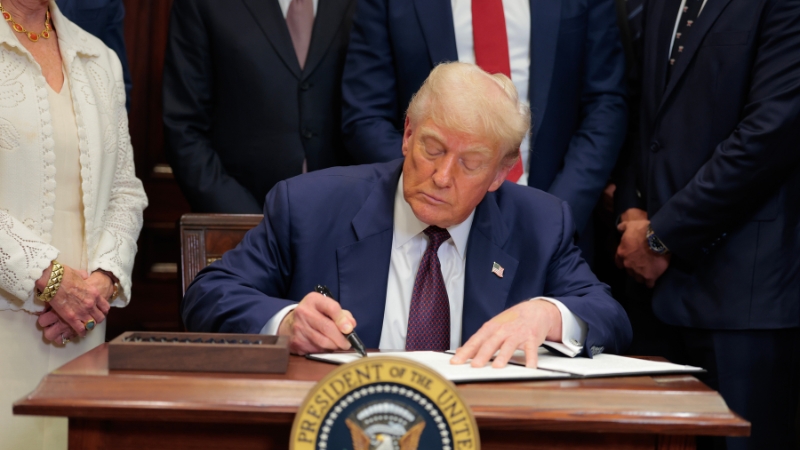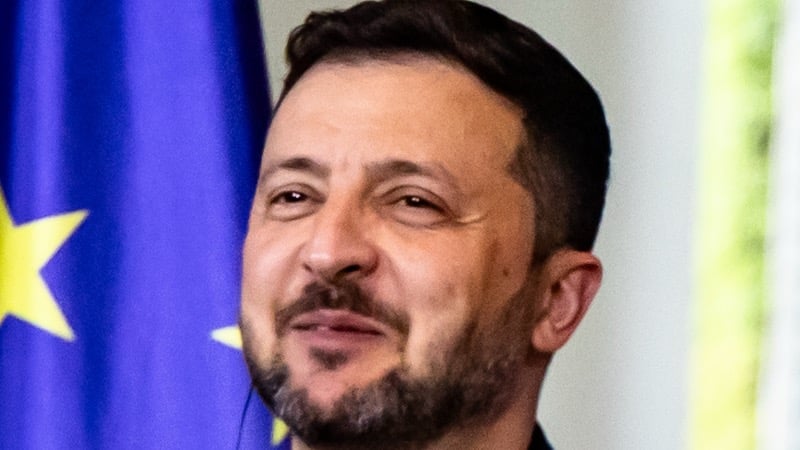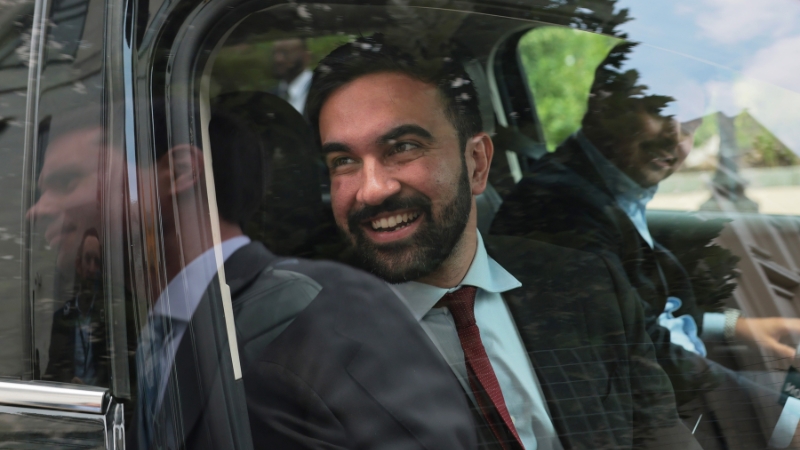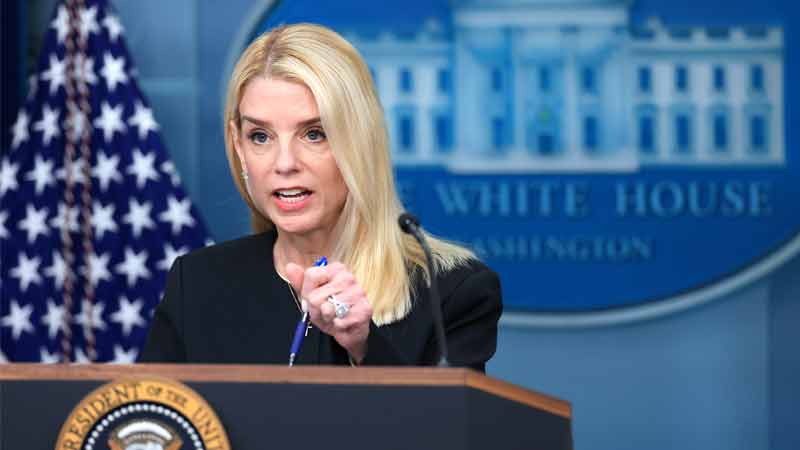 Image Credit: Anna Moneymaker / Staff / Getty Images
Image Credit: Anna Moneymaker / Staff / Getty Images You know the scene I’m talking about. The really cool one in Sicario II: Day of the Soldado, where the Black Hawk intercepts the convoy of cartel footsoldiers on the open highway somewhere near the US-Mexico border and blockades it, then Josh Brolin and his fellow elite tier-1 operator badasses hop out and gun down every single one of the scumbags without mercy and rescue the little girl being held hostage. Kino, as they say.
I posted the scene on Twitter yesterday when it was announced that President Trump had authorized the US military to go after the drug cartels. “We’re on the Sicario timeline,” I said, or words to that effect. I was one of many who reached, with barely concealed joy, for the very same clip.
The “Sicario timeline,” of course, is a timeline where the terrible might of the US military is deployed, at long last, against the foreign criminals who have wreaked havoc on American soil for decades, killing hundreds of thousands of Americans citizens with their drugs and trafficking hundreds of thousands, maybe even millions, of illegal immigrants across the border.
There can be no doubt that these groups are evil; that they present a clear threat to the safety and stability of the United States; and that they operate with quasi-state powers (they control territory, they have armies and bureaucracies, they dispense their own form of justice and they often successfully monopolize the use of force within their territory). What’s more, it’s obvious that the governments of the mainly shithole countries they come from have no real means to deal with them effectively, if indeed they want to. The degree to which the cartels are actually part of the government in these countries isn’t exactly clear, but that they are to some extent is beyond doubt.
In 2011, for some unknown reason, the DEA dropped an investigation that showed evidence of massive corruption linking the cartels right to the Mexican President Andres Manuel Lopez Obrado, otherwise known as “AMLO.” AMLO stayed on as president for another 13 years, then hand-picked his successor, Claudia Sheinbaum. So far, Mrs Sheinbaum has displayed stubborn resistance to any offer of American help fighting the cartels, even going so far as to threaten to alter Mexico’s constitution to protect them. I think we can guess why.
President Trump floated the idea of using military force against the cartels back in his first term. He talked openly about ordering bombing runs against cartel drug labs in Mexico, a suggestion which drove his defense secretary Mark T. Esper up the wall and caused Mexican officials to drop their enchiladas in outrage. It didn’t happen.
Then, in 2024, the idea gained currency again. President Trump said he’d “declare war” on the cartels if he was re-elected and deploy special forces and naval units against them.
Now, according to The New York Times, Trump has signed “a secret directive to the Pentagon” to make good on his campaign promise.
The Times hasn’t actually seen the directive, only spoken to people “familiar with the matter,” so we don’t know what it says or what it authorizes. The report goes on to say that “U.S. military officials have started drawing up options for how the military could go after the groups,” but again it doesn’t provide any specifics.
The Times, as we might expect, is most concerned with the legality of using military force against the cartels, and warns that US soldiers could find themselves in a whole lot of trouble—maybe even culpable for murder—if they end up killing civilians “who pose no imminent threat.”
Obviously, the law is an issue that deserves consideration, but really the Times just wants to portray the whole thing as yet more evidence that Trump has lost the plot and strayed into madman-dictator territory. “A sustained campaign would… raise further issues related to Mr. Trump’s push to use the military more aggressively to back a variety of his policies, often in the face of legal and constitutional constraints,” the Times states—which is an obvious reference to the deployment of National Guard and Marine units to Los Angeles when Gavin Newsom refused to police the streets himself, and probably also a reference to the militarization of the US-Mexico border, which has resulted in illegal crossings falling to the lowest recorded level ever.
The Times does note there are a number of clear precedents for what President Trump appears to want to do. These range from the invasion of Panama in 1989, which deposed strongman leader Manuel Noriega, who had been indicted in the US on charges of drug trafficking, to decades of military support provided to Colombia, Peru, Mexico and Honduras in their fights against the drug trade.
None of these precedents, though, involved direct use of American military force. The US military didn’t target the cartels for precision strikes or assassinations or even capture and rendition. All these operations were “framed as providing support for law enforcement authorities.”
Something else is needed. The Trump administration has already laid the groundwork for this “something else” by declaring a number of cartels terrorist organizations and invoking the Alien Enemies Act of 1798 to allow expedited deportation of foreign gang members on US soil.
But even if these groups are successfully labelled terrorists, there are still legal niceties that need to be respected, including the role of Congress in greenlighting the use of military force.
In the end, it may all turn on the ability of the President and his lawyers to construct a case that action against the cartels is not only in the national interest, but actually a form of self-defense.
Personally, I don’t think that will be hard. The dreadful scale of the opioid crisis in the US—which claims at least 100,000 lives a year—is argument enough, but then you’ve got the migrant crisis too, which the Trump administration has already argued was a deliberate hostile act against the American people. The cartels helped create that crisis and they benefited from it. If the border weren’t militarized right now, you can bet they’d still be benefiting from it.
The Trump administration might even be able to go further than simply declaring the cartels terrorist organisations. It might be possible to argue that actually, the real sovereign power in large parts of Mexico and other Latin American countries resides not with the government, but with the cartels, making them quasi-state actors and not really terrorists at all. They could be treated as hostile states or quasi-states and therefore subject to all the various conditions that can be imposed on hostile states. The US could, effectively, declare war on them. And it should.
If the second Trump term has demonstrated anything so far, it’s that there are ways and means. I was saying this in another piece I wrote yesterday, about why the Trump administration should consider reinstalling the statue of Robert E. Lee at Charlottesville. “You can just do things,” as people on the internet have been saying. You can.
You can launch immigration raids in sanctuary cities. You can designate foreign gang members as Enemy Aliens and ship them to the worst prison in Latin America. You can deport illegal aliens to third countries—how about Sudan? Or Eswatini?—if their home nations won’t take them. You can ignore the “nationwide injunctions” of Obama- and Biden-appointed activist judges.
You can use the US military against the cartels.
All that’s necessary is the will. And if the Mexicans or the Squatemalans don’t like it and start whinging about sovereignty and international norms, hit them with a 50% remittance tax or raise the tariffs on refried beans. That ought to do the trick.


